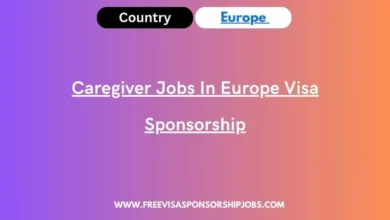How to Get Free Visa Sponsorship Jobs in Europe 2025
Do you want to work in Europe but are afraid of how much it will cost to get a visa? We’ll show you how to find jobs in Europe that will pay for your visa and help you get there for free. By taking these steps, you can increase your chances of finding jobs that will sponsor your visa without requiring you to spend a lot of money. So, let’s jump right in and learn more about jobs in Europe that pay for your visa.
How to Get Free Visa Sponsorship Jobs in Europe:
When a company helps a foreign worker get a work visa, this is called “visa sponsorship.” This sponsorship shows that the company is willing to help the employee move to their country and is willing to pay for it. If you can find a job that will sponsor your visa, you can legally work in Europe and enjoy the perks of living and working in a different country.
Research European Countries with Visa Sponsorship Programs:
Not every European country has the same programs and chances to get a visa sponsored. Start your trip by looking into which countries have good visa funding programs. Look for countries that need skilled workers and make it easy to get work cards. Some countries even have visa programs that are meant to bring in talented people from other countries.

Identifying In-Demand Job Industries:
Some jobs in Europe are more likely to help foreign workers get visas than others. Often, there aren’t enough skilled workers in these fields, so they actively look for talent abroad. Do some research and find out which businesses need people with your skills the most. By matching your skills and abilities to these fields, you can make it easier to find jobs that will pay for your visa.
Building an Impressive Resume and Cover Letter:
Make a resume and cover letter that show off your skills, abilities, and experiences in an interesting way. Make sure your papers meet the needs and preferences of employers in the country you want to work in. Focus on what makes you different from other people and how you can help the company grow. A well-written resume and cover letter can make it much more likely that a possible employer will notice you.
Read More: Switzerland Visa Sponsorship Jobs – Swiss Companies
Utilizing Online Job Portals and Networking Platforms:
Use online job portals and tools for professional networking to look for jobs in Europe. Websites like LinkedIn, Indeed, and Glassdoor often list job openings with visa sponsorship choices. Join related groups and communities and talk to people who work in your field. Networking can help you find jobs you might not have known about and make you more visible in the job market.
Tailoring Job Applications for Visa Sponsorship:
When you apply for jobs, be sure to mention that you want a visa sponsor and are ready to move. Personalize your job applications to show how your skills and abilities match what the job needs. Tell them how excited you are to work in Europe and how committed you are to helping the company succeed.
Preparing for Interviews and Showcasing Your Skills:
If you are invited to an interview, it’s important to get ready well. Find out what the most popular interview questions are and practice answering them. During the interview, show off your skills, experiences, and ability to change to different cultures. Employers often look for people who can do well in different kinds of workplaces. Be sure of yourself, know what you want to say, and be excited about the chance to work in Europe.
Navigating the Visa Application Process:
Once you find a job that will sponsor your visa, you will need to figure out how to get a visa. Learn about the specific rules and procedures of the place where you will be working. Gather all the necessary documents, such as proof of job, qualifications, and financial stability. Carefully read the steps and send in your application within the time limit.
Benefits of Jobs:
- Superior Education and Health Care: Numerous European nations provide free or heavily subsidized education and healthcare to their citizens and employees. This means that you and your family have access to quality education and healthcare without incurring substantial costs.
- Solid worker protections: Typically, European nations have strong labor laws that protect employees’ rights. These laws typically govern working hours, paid leave, maternity and paternity leave, and protection against unjust termination.
- Generous social protections: The majority of European nations have robust social safety nets, such as unemployment benefits, welfare programs, and pensions. This serves as a safety net in the event of unemployment or retirement.
- Work-life equilibrium: Many European countries place a premium on work-life balance, with reduced working hours and more vacation time than many other nations. This affords employees more time for personal and family obligations.
- Multicultural Ambience: Europe is renowned for its demographic diversity and cultural wealth. Working in Europe can provide opportunities to interact with individuals from diverse backgrounds and cultures, which can be personally and professionally enriching.
- Competitive Compensation: European employment can offer competitive wages, depending on the industry and country. Certain industries, such as technology and finance, frequently offer lucrative employment opportunities.
- Access to International Markets Some European cities, such as London, Frankfurt, and Paris, are significant financial and business hubs, providing access to global markets and opportunities for international networking.
- Travel Possibilities: It is simple to travel within Europe and to neighboring regions due to its central location and well-developed transportation networks. This can be enticing for those who wish to explore various nations and cultures.
- Career Advancement: Europe is home to a variety of multinational corporations and industries. Working in Europe can provide opportunities for career advancement, such as exposure to international markets and the possibility to build a global network.
- Cultural and Way of Life Benefits Europe’s cultural landscape includes museums, theaters, historic sites, and a variety of cuisines. The continent’s cities are frequently renowned for their high quality of life, which includes access to parks and recreational activities, as well as a high standard of living.
Securing Accommodation and Settling in Europe:
Before you move to Europe, make sure you have a place to live and learn about the rental market there. Think about things like location, price, and how close it is to your job. Also, find out about the basic needs and cultural norms of the place you’ll be living in. This planning will help you get used to your new job and settle in quickly.
Understanding Rights and Responsibilities as a Visa-Sponsored Employee:
As an employee with a visa, it’s important to know what your rights and responsibilities are. Learn about the rules and laws about work in the place where you’ll be working. Know what your contract says, how long you have to work, and what you’re entitled to, like time off and health care. Follow the local rules and honor the cultural norms of the country you are visiting.
Networking and Expanding Your Professional Circle:
Networking is a great way to move up in your job, both within your organization and in the professional world as a whole. You can grow your network by going to business events, seminars, and conferences. Talk to professionals from different backgrounds and look for ways to learn from them. Having a strong network of professionals can help you find new jobs and make useful connections.
Staying Updated on Visa Regulations and Opportunities:
The rules and options for visas may change over time. Keep up with the latest changes in immigration laws and programs that help people get visas. Follow important immigration forums and newsletters, and if you need to, talk to immigration experts. If you know what’s going on, you can make smart choices about your job and visa options.
Overcoming Challenges and Maintaining Resilience:
There may be difficulties and setbacks on the way to getting jobs in Europe that will pay for your visa. It’s important to stay strong and have a good attitude throughout the process. Stay motivated, keep going even when things get hard, and learn from everything you go through. You will have a better chance of getting a good job in Europe if you don’t give up.
Conclusion:
With careful planning, study, and persistence, you can find jobs in Europe that will pay for your visa. If you know how the visa sponsorship process works, look into areas where jobs are in demand, and use online tools, you can increase your chances of finding jobs that will sponsor your visa. Don’t forget to tailor your applications, get ready for interviews, and be careful as you go through the visa application process. If you have the right attitude and work hard, you can start an exciting career journey in Europe.
Frequently Asked Questions:
Are free visa sponsorship jobs common in Europe?
Even though not all jobs in Europe offer free visa support, there are some that do, especially in fields where workers are in short supply. Researching and focusing on these areas can help you find jobs that will pay for your visa.
Can I apply for visa sponsorship before securing a job in Europe?
Most of the time, you’ll need a job offer with visa support to start the process of getting a visa. However, some countries have special visa programs that let people apply for a job seeker visa, which allows them to look for work in the country.
How long does the visa application process take?
The length of time it takes to apply for a visa depends on the country and the type of visa. It can be anywhere between a few weeks and a few months. To avoid delays, it’s important to plan ahead and start the visa application process early.




